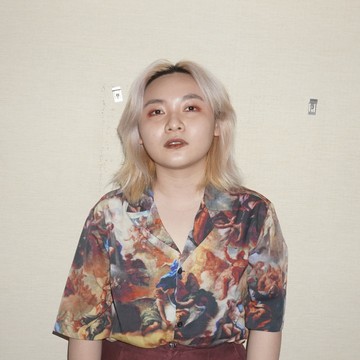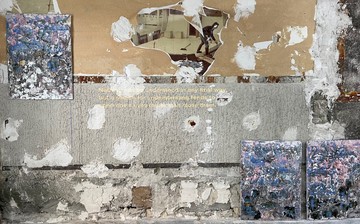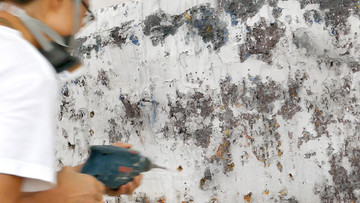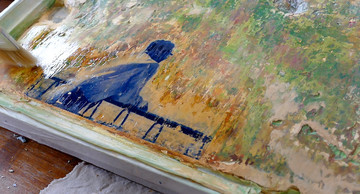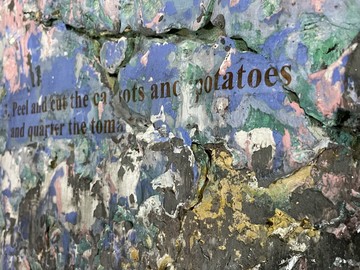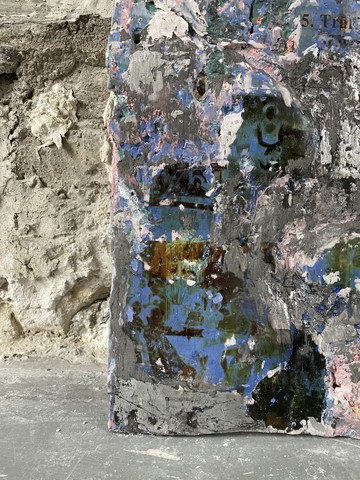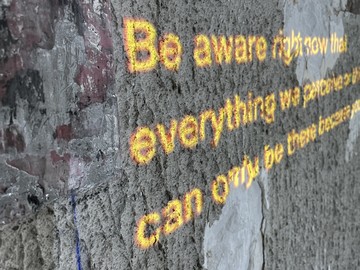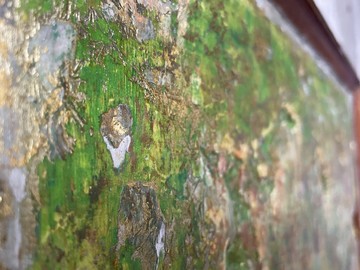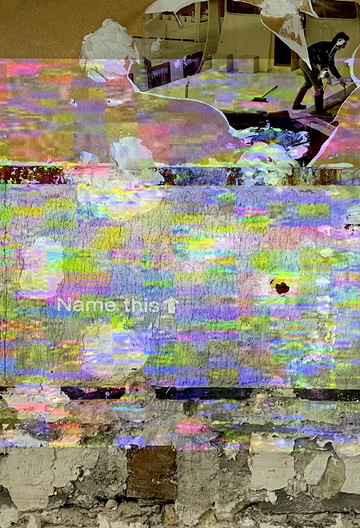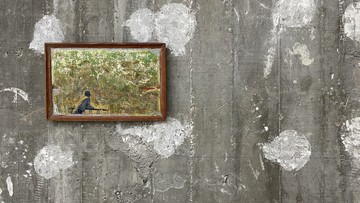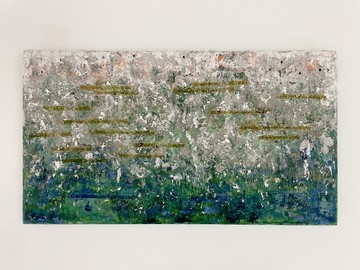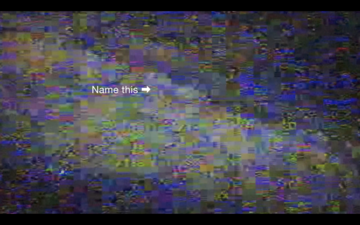A Voice in the Rupture
Negative Space is pleased to present the solo presentation of co-founder CHAN Ting curated by curator Clara Wong at Paris Internationale. CHAN Ting reflects on her interdisciplinary practice and in particular, explores her relationship with photography. Experimenting with images and researching transgenerational trauma have been integral to her creative process.
CHAN Ting considers images as a form that is constantly developing and evolving, which allows possibilities to thrive on uncertainties and a state of undefined. Highlighted through the recurring use of blur, cracks and fragments, it makes space for the imagination that inextricably intertwines with void, emptiness and loneliness. The artist continues to challenge the definition of images through the manipulation of textures and the environment. With this series of work, it will put you on a journey saturated with sensitivity and emotions, submerging you in this obscure domain.
Embodying a rupture, a deviant to defy the heredity of transgenerational trauma.
The works are the process of discovering, exploring, understanding and healing. Nothing is yet to be concluded nor will it ever be.
In this series of works, she intentionally used materials and tools that are commonly found in hardware stores and on the streets in Hong Kong. The ‘canvases’ were items collected from the streets, suitcases, food trays, and wood boards in various conditions but they all have one thing in common, they were discarded, forgotten, and abandoned. Reaching for plaster, clay and dirt, she smeared and piled them onto the surface, gloomed over the ghostly figures and unidentified strangers. Instead of letting the texture grow and spread like a disease, she picked up her drill and hammer, smashing it, cracking it and tearing it down on repeat, mirroring her struggle between forgetting and remembering. By repurposing materials and objects considered filthy and tarnished, she uncannily reflects on her journey of digging into the inconvenient truth of the past.
The images and visuals used in this installation were also collected by the artist. CHAN Ting first encountered these photographs when she was scanning boxes of films for a collector. These films documented the daily lives of some Hong Kong families in the 60s and 70s. If photograph supposedly lends itself to others’ convenience, the artist was borrowing these visuals to explore her relationship with her identities, sexualities and society at large. She featured obscure images with unidentified people and took interest in the stories behind these photos and the vacuum of untraceable stories. Through the process of constructing and disrupting, she found these pauses and chasms to re-narrate her stories and experiences. She expanded the space in between, not only filling the gaps and absences in the past with her imagination but disrupting the linear and patriarchal storytelling in our society, manifesting how one thrives in care and patience. She has transformed those agonizing moments and internal turmoil through her works and gradually gained the relief she longed for.
Her coping mechanism is incorporating the banal and mundane fragments in her daily life to counteract the overshadowing trauma as a Hong Konger. These trivial moments rebel against the domination of pretence and denial. The fragmented experiences are encapsulated by the track composed and arranged by the artist, compiling sounds and noises collected in Hong Kong. Layered and overlapped with random urban sounds, the track included sounds in public spaces, announcements, pedestrian crossing sounds, eavesdropping on passers-by conversations, and awkward encounters at social events. Then intersected with domestic sounds, like cleaning, rubbing, showering, mouse-clicking, and noises from electrical appliances. Clinging onto these fleeting moments and interactions, we are allowing ourselves to trespass and interrupt the grand narrative that society imposed on us. The artist amplified these insignificant seconds and minutes to contextualize the experience as urban dwellers, wandering and getting lost. These detours are creating spaces for the interpretation and repair of collective trauma and the tear in the social fabric.
For this solo presentation, CHAN Ting has peeled herself off to reveal the deeply personal and aching experience that she and her family struggled and battled with for many years. Buried and repressed in her paternal family history, there has always been a gap that forbids her to comprehend her own emotions, her relationships with others and the world. The taboo around mental issues has crept in and haunted her family for generations. Experiencing a repressive upbringing and the aftermath of family trauma, she decided it was her calling to break the vicious cycle and make this past into something that could bring hope and reconciliation.
With A Voice In The Rupture, CHAN Ting highlighted distance opens up spaces for possibilities and exploration of oneself. By maintaining distances, she has allowed herself to be observant, ruthlessly dissecting her discomfort and insecurities to untangle the complexities that shaped her and her relationships with others and society. Such vulnerability inevitably unfolded mess and chaos, yet she embraced them and laid herself bare in this showcase, extending an individual’s trauma to the collective trauma of a city. From all the cracks and rifts in the show, you might find yourself confronting your wounds and pain, we genuinely hope you will gently submerge yourself in uncertainties and the unknown. May you get your antidote.
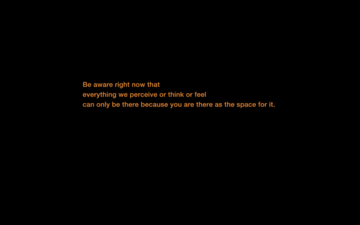
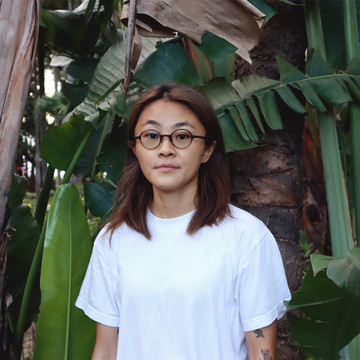
Chan Ting
(b. 1993, Hong Kong)
She works in the fields of image, installation, performance and sound (stage name: ct1993).
Chan’s research explores luminous mind and contemporary imaging. With a focus on visual dialogue connecting mental image and sound-image, her practice often emerges as a stream of consciousness.
She is the co-founder and curator of an independent artist-run space - Negative Space, dedicated to developing contemporary art, imaging and lens-based media.
Clara Wong Tze Yan
(b.1994, Hong Kong, based in London)
Graduated from Chinese University of Hong Kong with a major in Cultural Studies. Studied her MA in Culture, Criticism and Curation at Central Saint Martins, where she co-curated we [ breathe ] in the space between (2019). Her most recent exhibitions include We Are Our Own Demons (2021), things left unsaid (2021), Safety Blanket (2022); Negative Space, and co-curated UNSCHEDULED Second Edition (2021); Hong Kong Art Gallery Association.
Her research interests are based on popular culture, fashion, gender and queer studies; with a particular focus on the personal and living experiences of marginalised communities, excluded and dismissed. Her most recent projects investigate the cultural significance of failures, trauma, and fragmented urban experiences, borrowing queer studies as a strategy to transgress and expand spaces for discussion and conversation. She continues to develop her curatorial capacity through alternative spaces, and collaborative and interdisciplinary practice.
